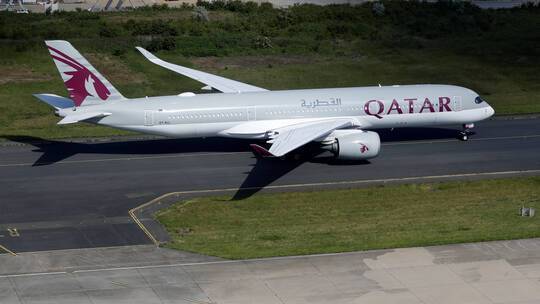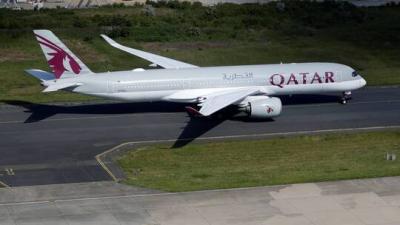Qatar Airways Group published its annual report for the fiscal year 2020/2021 yesterday, highlighting a period filled with significant challenges due to the COVID-19 pandemic and its impact on the global travel sector, which faced enormous losses in passenger traffic and revenues. Nonetheless, Qatar Airways Group demonstrated its ability to confront these challenges, just as it has in many previous instances, reaffirming its resilience, commitment, and robustness of operations.
The group recorded a net loss of 14.9 billion Qatari riyals (4.1 billion USD), which includes an asset impairment of 8.4 billion Qatari riyals (2.3 billion USD) due to the grounding of its Airbus A380 and A330 aircraft. The group’s operational losses were reduced by 7% to 1.1 billion Qatari riyals (288.3 million USD) compared to the previous fiscal year, with a significant improvement in EBITDA, which reached 6 billion Qatari riyals (1.6 billion USD), compared to 5 billion Qatari riyals (1.4 billion USD) last year, affirming the success of the initiatives the group undertook to overcome numerous challenges.
Air cargo and adaptability played a crucial role in this recovery, as the group's commercial strategy significantly contributed to increasing its market share and enabled the group to expand its operations beyond merely repatriating travelers during the peak of the pandemic, also playing a vital role in rebuilding travelers' confidence in air travel during one of the toughest times in commercial aviation history. In this context, Qatar Airways Cargo maintained its position as the largest global cargo airline, increasing its market share during the fiscal year, with daily flights more than tripling, achieving a record of operating 183 flights in a day in May 2020.
The airline witnessed a 4.6% increase in the tonnage handled compared to the previous fiscal year, with 2,727,986 tons (gross weight) handled in 2020/2021. This increase led to Qatar Airways Cargo's revenues more than doubling.
Despite unprecedented difficulties faced by the global aviation sector for the first time in its history, Qatar Airways rebuilt its destination network from 33 destinations during the peak of the pandemic to over 140 destinations it serves today. Unlike its airline counterparts, the carrier continued its efforts to launch flights to new markets, having launched services to 9 new destinations, namely: Abidjan in Ivory Coast, Abuja in Nigeria, Accra in Ghana, Brisbane in Australia, Harare in Zimbabwe, Luanda in Angola, Lusaka in Zambia, San Francisco and Seattle in the United States.
The airline was one of the very few that continued to operate flights to major cities worldwide such as Amsterdam, Dallas Fort Worth, London, Montreal, Sao Paulo, Singapore, Johannesburg, Sydney, and Tokyo. Additionally, it expanded its operations in several markets to levels surpassing pre-pandemic standards, including flights to Brazil, Canada, Nigeria, and the United States, confirming it is on the right track to benefit from the global travel sector's recovery.
The group also made significant progress in its ambition to establish new strategic partnerships with global airlines, including American Airlines, Air Canada, Alaska Airlines, and China Southern Airlines. These partnerships will join the already numerous existing partnerships with airlines such as JetBlue, Iberia, LATAM, Cathay Pacific, Oman Air, and others, enhancing the company's position and network of destinations, enabling it to provide more travel options.
Commenting on a year characterized by significant challenges, His Excellency Akbar Al Baker, CEO of Qatar Airways Group, stated: "There are three words in my opinion that can describe the approach and response of Qatar Airways Group in the last fiscal year, and these are: strength, resilience, and commitment. Strength and perseverance when taking risks and making tough decisions, resilience to remain highly focused and not to succumb to challenges, and commitment not to abandon our promise to serve our customers, partners, and employees."
“At a time when many competing companies decided to halt their operations and suspend flights to most of their destinations, we at Qatar Airways developed our entire commercial operations to align with imposed travel restrictions, ensuring that we continued our flights and operated a suitable network of destinations that travelers could rely on. Thanks to our diverse fleet of modern aircraft that are fuel-efficient, we were able to operate a large number of charter flights and maintain our commitment to bringing stranded travelers home safely while contributing to the continuity of global supply chains for transporting medical aid and essential needs to combat COVID-19. We also reinforced our operations in the charter flight sector in response to the increasing demand for these flights that helped many travelers during difficult and challenging times. These flights received acclaim from everyone, particularly many governments and institutions from around the world. This commercial flexibility has solidified our position as leaders in the recovery phase of the global aviation and travel sector."
He added: "I must express my pride in all the employees of Qatar Airways Group who have demonstrated their ability to quickly adapt to the new reality, showcasing perseverance, resilience, and a commitment to excellence—values that are always closely associated with everything we do."
Al Baker confirmed: "I would also like to take this opportunity to express our gratitude to the group’s shareholder, the Government of Qatar, for its strong and unwavering support for Qatar Airways Group during these unprecedented times. While the group did not receive any support in the form of salaries or grants, the Qatari government, the owner of the group, injected capital of 11 billion Qatari riyals (3 billion USD) to support the continuity of our operations."
Al Baker concluded: "The strength of our financial operations has significantly enabled us to continue focusing on long-term goals through investing in a sustainable and efficient fleet of aircraft, utilizing the latest technology, enhancing our strategic partnerships with major global airlines, and launching flights to new markets. There is no doubt that this strategic vision will lead us to emerge from this challenging period stronger than ever, while continuing to maintain our position as the leading airline in the world."




